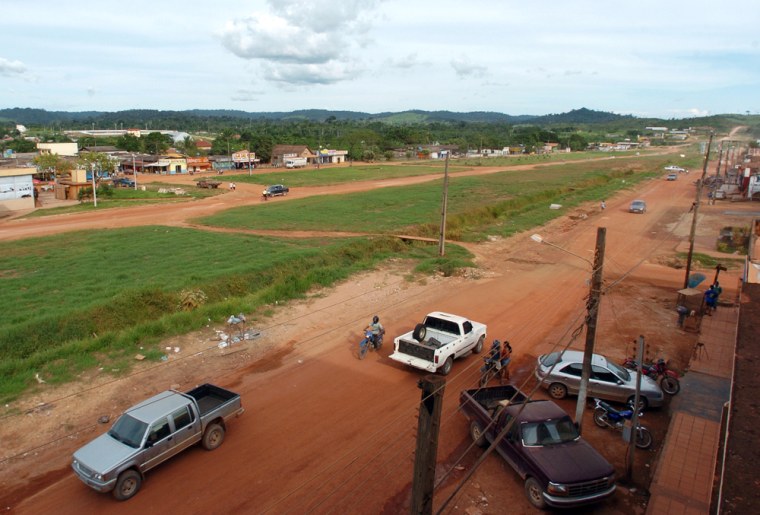Three decades ago, only Indians and wild animals roamed through this remote stretch of Amazon jungle. Today, ranchers and sawmill owners in fully loaded four-wheel-drive pickups speed past new stores selling construction materials, farm equipment and chain saws.
Near the small red-light district, the poor cram into roofless homemade jalopies called “Paco Pacos” for the clunky sound emitted by their motors, diesel generators discarded by gold prospectors. And on the town’s outskirts, where businesses give way to cow pastures and fields of rice and soy, a sign marks the spot where investors plan to build a slaughterhouse with a daily capacity of 500 head of cattle.
This is Novo Progresso, “New Progress” in Portuguese, a Brazilian boomtown built by migrants from far-flung parts of Latin America’s largest country in an influx reminiscent of the 19th century settlement of the American west.
All are speculating that the dirt highway cutting through the town’s center — a muddy track during the six-month rainy season that turns into a rutted cloud of dust the rest of the year — will be paved and transformed into a modern toll road traveled by thousands of tractor-trailers a day heading to Amazon River and Atlantic Ocean ports.
From five to 34 sawmills
In a region where land conflicts, labor abuses and illegal logging are commonplace, Novo Progresso’s population has doubled to 40,000 in just five years. The number of sawmills turning huge trees into high-quality wood has risen from five to 34 in the same period.
“When they pave the highway, it’ll be cheaper for our products to get to Europe and the United States,” said a beaming Luiz Bazanella, a beer and soft-drink distributor who heads the town’s business and industry association. “Novo Progresso’s population could grow to 200,000.”
Environmentalists say illegal deforestation is rampant around Novo Progresso, while sawmill operators say they use only wood cut legally by people living on land where the government allows 20 percent of each plot to be felled.
But Novo Progresso’s sawmills laid off thousands of workers this year when the government put a halt to most logging, questioning the validity of documents used to justify land ownership. Town officials warn a crisis is in the works that could get ugly and cause unabated deforestation if the ban stays in place.
“If the government doesn’t act soon to resolve the situation, the loggers are just going to cut it all down,” said Mayor Tony Rodrigues.
Gunmen force poor off land
Novo Progresso also is saddled with a reputation as one of the most lawless spots in Para state — a place where gun-toting “pistoleiros” working on behalf of land speculators and rich landowners force poor subsistence farmers off their land.
Nelson Jose Biesseck, the leader of a group representing poor farmers, remembers how his cousin’s husband was gunned down in a land dispute a decade ago. The cousin herself was shot dead a year later.
“We still don’t know who killed her,” Biesseck said.
And last year, a farmer who accused a logger of illegally cutting trees on Indian reservations and national park land was killed outside his house by two gunman who pumped six shots into him before fleeing.
Rodrigues bristles at the suggestion that Novo Progresso is South America’s version of the Wild West, saying crime is much worse elsewhere in Brazil and insisting most town residents are law-abiding citizens seeking a better life.
“Sure, there are pistoleiros here, but they can’t just walk around freely with their guns drawn,” he said. “Most of the people in Novo Progresso came here with a dream to build something, because land prices were cheap, and with the hope that the road would be built and there would be jobs and more business.”
U.S. nun's murder
In February, gunmen in another Para town killed American nun Dorothy Stang in a crime authorities have linked to a land dispute. The government reacted by sending federal police and soldiers to keep the peace in towns across Para, including Novo Progresso.
Now soldiers with semiautomatic rifles head out to the town’s airport to check the paperwork of everyone leaving and arriving on the only daily commercial flight, a twin-engine propeller plane that bumps to a stop on the dirt runway.
Road supporters say the government presence should be expanded so the town can avoid past problems as it braces for an even bigger flood of migrants.
“Now we’ve got soldiers and police on the streets, but why didn’t we get them before the nun died?” Bazanella asked. “If you have control here, you will have deforestation, but it will be controlled. You won’t have guys coming in saying, ‘I’m going to clear 2,000 hectares (5,000 acres) just because I can.”’
